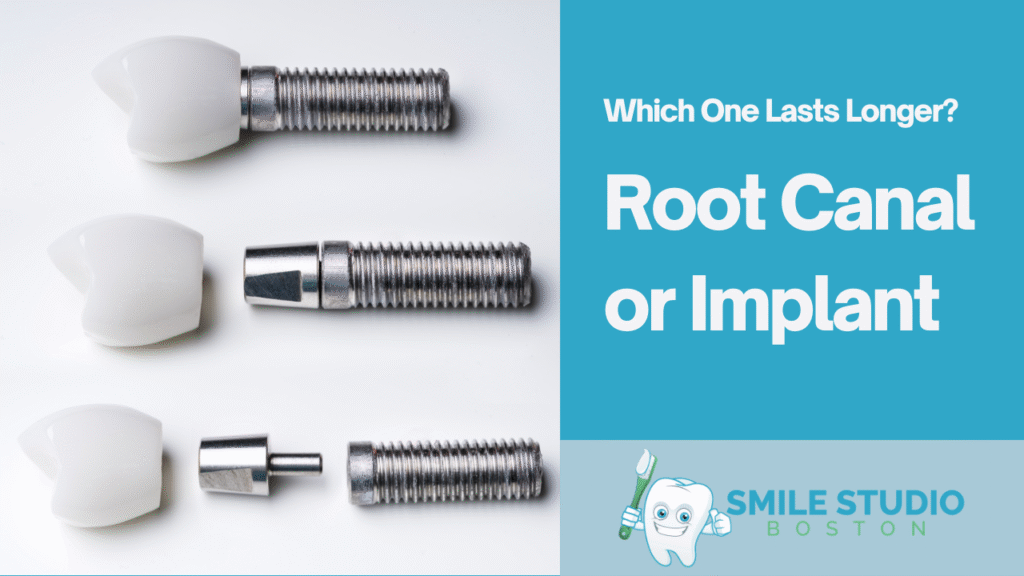Patients often face a critical decision when dealing with a severely damaged or infected tooth: root canal or implant. Both treatments offer solutions for saving or replacing a tooth, but their longevity varies based on multiple factors. Understanding root canal vs implant pros and cons can help determine which option best suits your dental needs.
I. Understanding Root Canal Therapy
A root canal is a procedure designed to remove infected pulp from inside a tooth while preserving the natural structure. It is typically recommended when the tooth’s roots are still strong, but the inner pulp is diseased.
Procedure Overview:
- The dentist removes the infected pulp.
- The inside of the tooth is cleaned and disinfected.
- The space is filled with a biocompatible material.
- A crown is placed to restore strength and function.
Factors Influencing the Longevity of a Root Canal-Treated Tooth:
- Success depends on how well the tooth is sealed after treatment.
- Proper oral hygiene and routine dental visits can extend the lifespan of the treated tooth.
- If not properly maintained, root canal replacement may be needed.
II. Understanding Dental Implants
A dental implant is an artificial tooth root, typically made of titanium, that is surgically placed into the jawbone to support a replacement tooth or bridge.
Procedure Overview:
- The damaged tooth is extracted if necessary.
- A titanium post is surgically inserted into the jawbone.
- The jawbone heals and fuses with the implant (osseointegration).
- A custom crown is attached to the implant.
Factors Influencing the Longevity of Dental Implants:
- Bone density and overall oral health.
- Implant material and quality of the prosthetic tooth.
- Regular dental checkups to monitor implant health.
III. Longevity Comparison: Root Canal vs Implant
Studies suggest that a well-maintained dental implant vs root canal-treated tooth can last 15-25 years or more. However, root canal-treated teeth may require root canal replacement if reinfection occurs or if the structure weakens over time. Dental implants, on the other hand, can last a lifetime with proper care.
IV. Root Canal vs Implant: Pros and Cons
1. Pros of Root Canal Therapy:
The pros of root canal therapy are as follows:
- Preserves the natural tooth structure.
- Less invasive than an implant procedure.
- More affordable in the short term.
- Eases severe tooth pain by removing infected tissue.
- Avoids extraction and related issues.
- Restores biting, chewing, and speaking abilities.
2. Cons Of Root Canal Therapy
The cons of root canal therapy may include:
- The tooth may become brittle over time.
- Potential need for root canal replacement if reinfection occurs.
- Not viable if the tooth is too damaged.
- Process challenges may cause tooth loss.
- It may be costlier without insurance.
3. Pros Of Dental Implants:
The pros of the dental implant process may include:
- High durability and longevity.
- Prevents bone loss in the jaw.
- Functions like a natural tooth.
- With proper care, they can last a lifetime.
- Maintenance is similar to natural teeth.
- They’re secure and don’t shift like dentures.
4. Cons Of Dental Implants:
The cons of dental implants may include:
- Requires surgical placement.
- Higher initial cost.
- Longer healing period.
- Implants May Not Be Covered by Your Insurance
- Extended Recovery Time
V. Factors to Consider When Choosing Between Root Canal and Implant
1. Condition of the Affected Tooth: If the tooth structure is strong, a root canal vs implant decision may lean toward preserving the tooth.
2. Overall Oral and Systemic Health: Patients with certain health conditions may not be ideal candidates for implants.
3. Financial Considerations: While implants have a higher upfront cost, they may be more cost-effective in the long run.
4. Patient Preferences and Lifestyle Factors: Some patients prefer to keep their natural teeth when possible, while others opt for a long-term implant solution.
Key Takeaways
Both root canal vs implant treatments offer excellent solutions for damaged teeth. While a dental implant vs root canal may last longer, root canals allow patients to retain their natural teeth. Consulting with a dentist is essential to making the right choice based on your unique dental condition, budget, and long-term goals.
At SmileStudio, we believe that quality dental care should be both accessible and affordable. Our experienced team is dedicated to helping you make the best decision for your oral health and budget.
Whether you need a root canal, extraction, or tooth restoration, we provide flexible payment options, MassHealth acceptance, and emergency dental care to ensure you receive the treatment you need—when you need it.
💡 Don’t wait until it’s too late! Protect your smile with expert care tailored to your needs.
📞 Call us today at +1 (617) 265-5606 to schedule your consultation.
🌐 Visit us online: SmileStudioBoston.com
📍 Find us at 1428 Dorchester Ave, Dorchester, MA 02122, United States.
Your smile deserves the best—let SmileStudio be your trusted dental partner!
FAQs
Q. Do Implants Last Longer Than Root Canals?
Yes, dental implants typically last longer than root canals. Implants can last a lifetime with proper care, while root canal-treated teeth may need retreatment after 10–15 years.
Q. Which Is Better: Root Canal or Implant?
The best choice depends on the tooth’s condition. A root canal preserves the natural tooth, while an implant is a long-term solution if the tooth is beyond saving.
Q. How Long Is an Implant Effective?
A dental implant remains effective indefinitely with good care. However, the attached crown may need replacement after 10–15 years due to wear and tear.
Q. What Is the Lifespan of a Root Canal?
A root canal-treated tooth can last 10–15 years or more. Its longevity depends on oral hygiene, the strength of the restoration, and the absence of reinfection.


